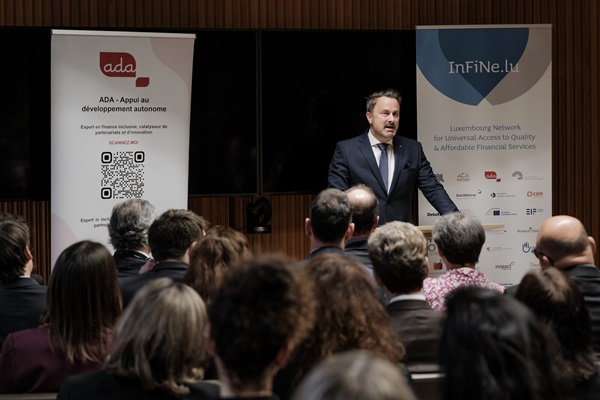 Minister Xavier Bettel address a meeting at the House of Microfinance;
Credit: InFiNe
Minister Xavier Bettel address a meeting at the House of Microfinance;
Credit: InFiNe
On Monday 4 March 2024, the House of Microfinance was visited by Luxembourg's Deputy Prime Minister and Minister for Development Cooperation and Humanitarian Affairs, Xavier Bettel.
Luxembourg, through the Directorate for Development Cooperation and Humanitarian Affairs of the Ministry of Foreign and European Affairs, Defence, Development Cooperation and Foreign Trade, actively supports the development of inclusive finance as an essential tool to contribute to the reduction of extreme poverty.
At the House of Microfinance, Minister Bettel met with representatives of ten organisations present in Luxembourg and active in the sector of inclusive finance: Appui au développement autonome (ADA), the Alliance for Financial Inclusion (AFI), the European Microfinance Platform (e-MFP), The Global Green Growth Institute (GGGI), IforD - Forestry and Climate Change Fund, the Inclusive Finance Network Luxembourg (InFiNe), the Luxembourg Finance Labelling Agency (LuxFLAG), the Microinsurance Network (MiN), microlux, and the Social Performance Task Force (SPTF).
All of the above are among the 37 organisations that make up the membership of InFiNe, which was founded in 2014 to bring together the public, private and civil society actors involved in inclusive finance.
During his visit the Minister shared his perspectives on the crucial role of inclusive finance as an instrument for Luxembourg’s Development Cooperation.
"As Minister for Development Cooperation and Humanitarian Affairs, I am convinced that our commitment to inclusive finance resonates with our overarching objective of fostering sustainable development and in fine eradicating extreme poverty. To achieve the Sustainable Development Goals, we cannot rely on public funds alone. On the contrary, we recognise the pivotal role of Official Development Assistance as a catalyst for mobilising private capital towards achieving the SDGs.", Minister Bettel said.
Inclusive finance refers to the provision of financial services, such as banking, credit, insurance, and savings, to individuals and businesses that have been excluded from traditional financial systems. Inclusive finance seeks to empower marginalised communities, foster entrepreneurship and promote economic growth while reducing income inequality.
According to the World Bank, 2.5 billion people around the world remain excluded from financial services. Most are in developing countries, but not all: more than 13 million adult EU citizens still lack access to formal financial services.
This inaugural visit by Minister Bettel and his delegation reflected the long-standing partnership between the Luxembourg government and the inclusive finance ecosystem.








